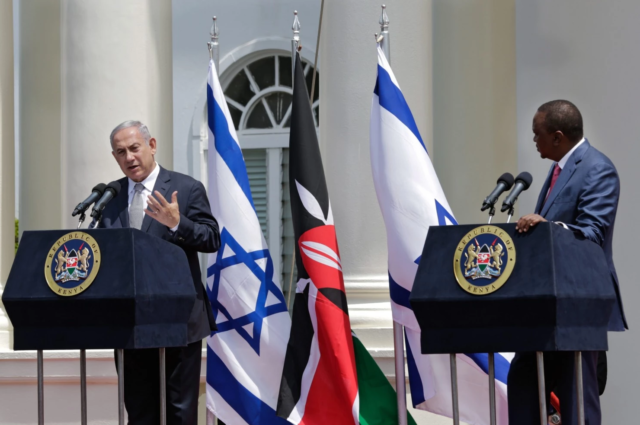
Israeli Prime Minister Benjamin Netanyahu arrived in Uganda on July 4th starting a four-nation tour to meet with political and business leaders in a bid to strengthen ties with Africa. The historic trip – the first visit to the continent by an Israeli prime minister in over 30 years – comes as Israel launches a $13 million aid package for the region.
Netanyahu began his trip in Uganda, commemorating the 40th anniversary of the Entebbe rescue. The IDF mission freed 94 Israeli passengers held hostage after Palestinian and German terrorists hijacked an Air France plane. Netanyahu’s brother was the only Israeli soldier killed in the rescue; three hostages also died. Terrorism was a major focus of the trip as Netanyahu met with seven African heads of state to discuss security issues including military training and border controls. The aligning of interests comes amid the rise of Islamic extremism in nations such as Kenya, Rwanda, and Ethiopia – the three other nations Netanyahu will visit.
Amid these security concerns, African nations hope to grant Israel African Union (AU) observer status, a move previously blocked by Libya and South Africa. Kenyan President Uhuru Kenyatta backed the move noting Africa’s need, “to engage Israel on a more positive basis” in a push for global peace and security. He highlighted Israel’s expertise in the field of technology as one of the most powerful ways AU member states can benefit from their relationships with the Jewish State.
Israel’s Prime Minister also wants to deepen trade and energy ties with Africa. Currently, direct commerce to the continent constitutes only two percent of Israel’s foreign trade. To help improve the situation, leaders from 70 Israeli companies embarked on a simultaneous business venture to the continent, taking part in meetings to discuss business start ups in Kenya on Tuesday. An aid to Netanyahu characterized the opportunity: “We know that we have a competitive advantage in the areas such as water, agriculture, cyber, information technology and energy. We want to help these companies gain a foothold in Africa.”
On the energy front ties are already growing. Israeli firm Energiya has successfully demonstrated the potential of Israeli companies bringing their expertise to Africa. The company erected nearly 30,000 solar panels at just one project in Rwanda, and is investing in a 10-country clean energy plan to replace expensive fossil fuels.
Though unfavorable security challenges link Israel and the African Union, the normalization of relations could, according to Netanyahu, bring Israel “back to Africa in a big way.”

